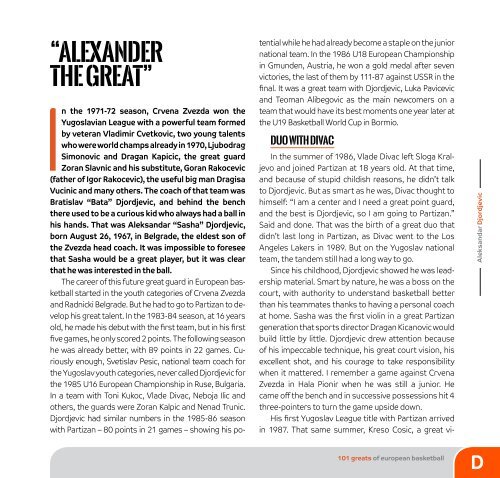101 Greats of European Basketball
Create successful ePaper yourself
Turn your PDF publications into a flip-book with our unique Google optimized e-Paper software.
“Alexander<br />
the Great”<br />
In the 1971-72 season, Crvena Zvezda won the<br />
Yugoslavian League with a powerful team formed<br />
by veteran Vladimir Cvetkovic, two young talents<br />
who were world champs already in 1970, Ljubodrag<br />
Simonovic and Dragan Kapicic, the great guard<br />
Zoran Slavnic and his substitute, Goran Rakocevic<br />
(father <strong>of</strong> Igor Rakocevic), the useful big man Dragisa<br />
Vucinic and many others. The coach <strong>of</strong> that team was<br />
Bratislav “Bata” Djordjevic, and behind the bench<br />
there used to be a curious kid who always had a ball in<br />
his hands. That was Aleksandar “Sasha” Djordjevic,<br />
born August 26, 1967, in Belgrade, the eldest son <strong>of</strong><br />
the Zvezda head coach. It was impossible to foresee<br />
that Sasha would be a great player, but it was clear<br />
that he was interested in the ball.<br />
The career <strong>of</strong> this future great guard in <strong>European</strong> basketball<br />
started in the youth categories <strong>of</strong> Crvena Zvezda<br />
and Radnicki Belgrade. But he had to go to Partizan to develop<br />
his great talent. In the 1983-84 season, at 16 years<br />
old, he made his debut with the first team, but in his first<br />
five games, he only scored 2 points. The following season<br />
he was already better, with 89 points in 22 games. Curiously<br />
enough, Svetislav Pesic, national team coach for<br />
the Yugoslav youth categories, never called Djordjevic for<br />
the 1985 U16 <strong>European</strong> Championship in Ruse, Bulgaria.<br />
In a team with Toni Kukoc, Vlade Divac, Neboja Ilic and<br />
others, the guards were Zoran Kalpic and Nenad Trunic.<br />
Djordjevic had similar numbers in the 1985-86 season<br />
with Partizan – 80 points in 21 games – showing his potential<br />
while he had already become a staple on the junior<br />
national team. In the 1986 U18 <strong>European</strong> Championship<br />
in Gmunden, Austria, he won a gold medal after seven<br />
victories, the last <strong>of</strong> them by 111-87 against USSR in the<br />
final. It was a great team with Djordjevic, Luka Pavicevic<br />
and Teoman Alibegovic as the main newcomers on a<br />
team that would have its best moments one year later at<br />
the U19 <strong>Basketball</strong> World Cup in Bormio.<br />
Duo with Divac<br />
In the summer <strong>of</strong> 1986, Vlade Divac left Sloga Kraljevo<br />
and joined Partizan at 18 years old. At that time,<br />
and because <strong>of</strong> stupid childish reasons, he didn’t talk<br />
to Djordjevic. But as smart as he was, Divac thought to<br />
himself: “I am a center and I need a great point guard,<br />
and the best is Djordjevic, so I am going to Partizan.”<br />
Said and done. That was the birth <strong>of</strong> a great duo that<br />
didn’t last long in Partizan, as Divac went to the Los<br />
Angeles Lakers in 1989. But on the Yugoslav national<br />
team, the tandem still had a long way to go.<br />
Since his childhood, Djordjevic showed he was leadership<br />
material. Smart by nature, he was a boss on the<br />
court, with authority to understand basketball better<br />
than his teammates thanks to having a personal coach<br />
at home. Sasha was the first violin in a great Partizan<br />
generation that sports director Dragan Kicanovic would<br />
build little by little. Djordjevic drew attention because<br />
<strong>of</strong> his impeccable technique, his great court vision, his<br />
excellent shot, and his courage to take responsibility<br />
when it mattered. I remember a game against Crvena<br />
Zvezda in Hala Pionir when he was still a junior. He<br />
came <strong>of</strong>f the bench and in successive possessions hit 4<br />
three-pointers to turn the game upside down.<br />
His first Yugoslav League title with Partizan arrived<br />
in 1987. That same summer, Kreso Cosic, a great vi-<br />
<strong>101</strong> greats <strong>of</strong> european basketball<br />
Aleksandar Djordjevic<br />
D
















